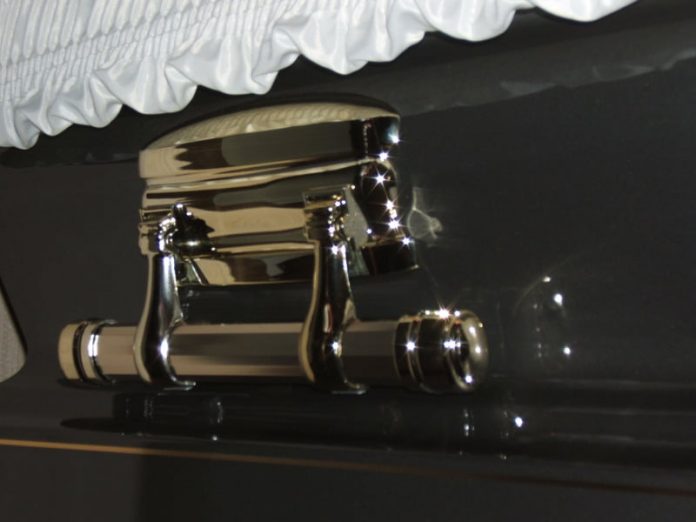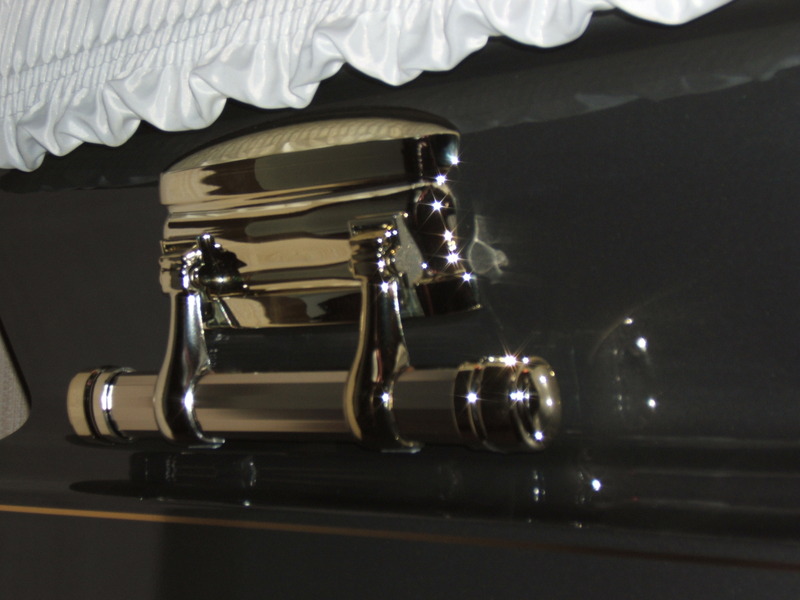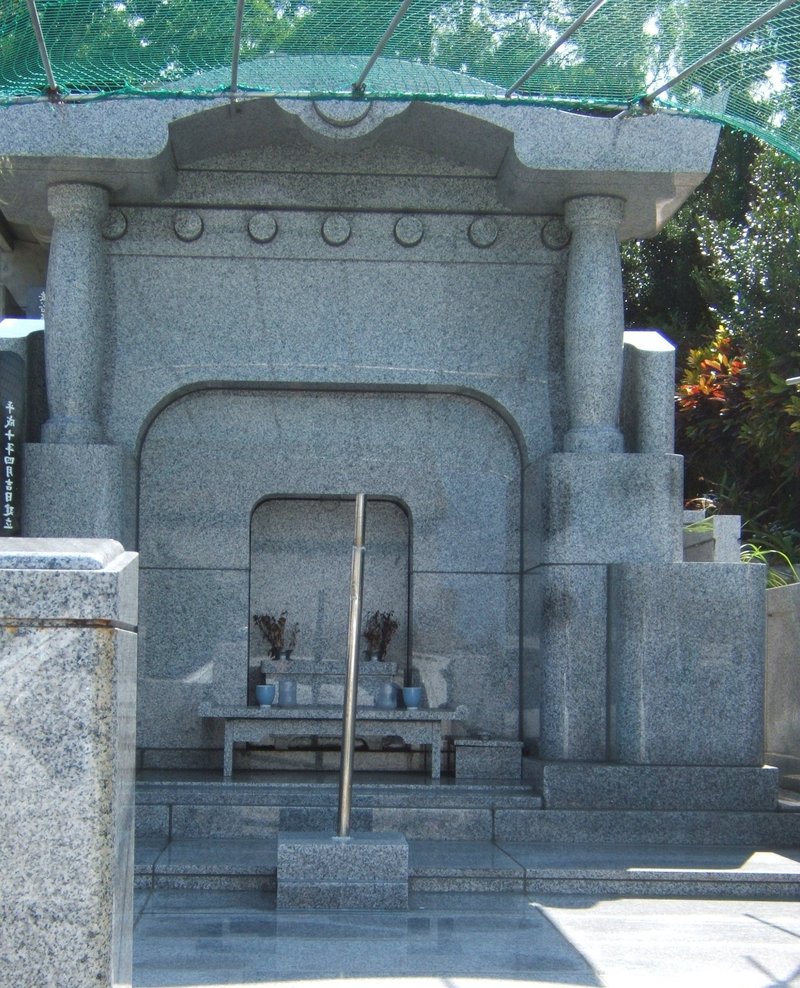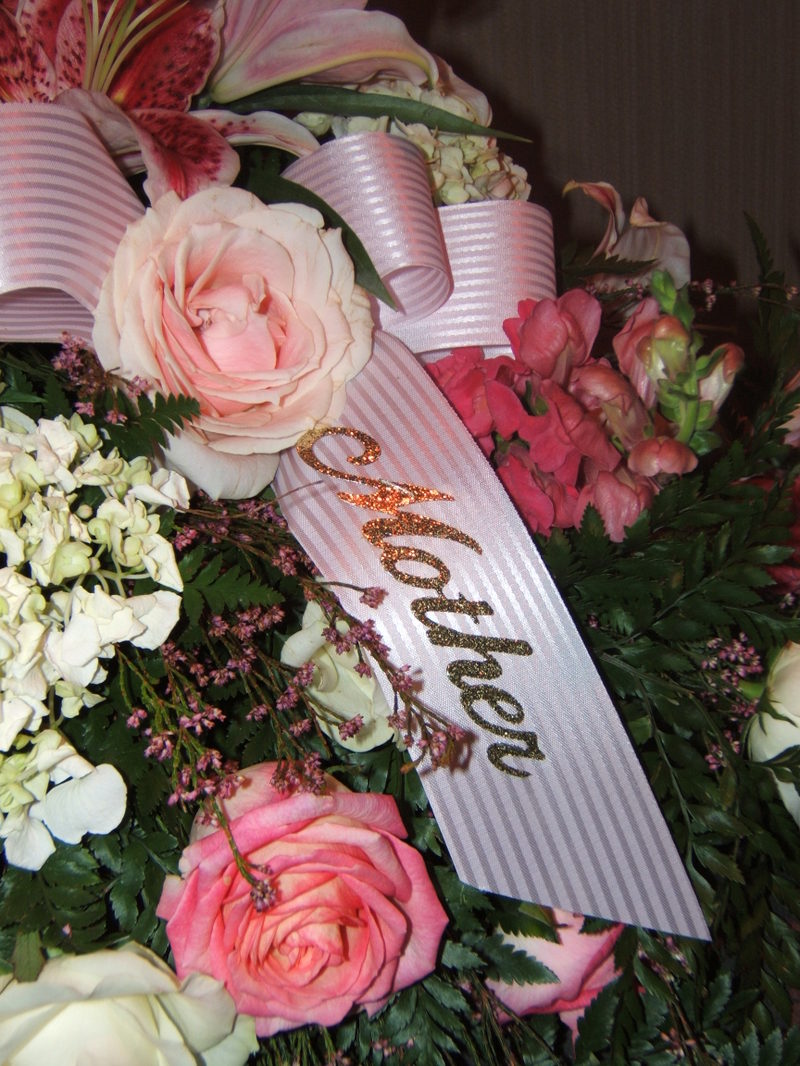CONTRIBUTED BY STACI HAWLEY
Rites of passages. All cultures have them. And if you are lucky enough to know a few local people who are willing to share- you can really learn a lot. We’ve covered the cultural nuances of weddings here, so I thought I would broach another topic; death and the rituals behind it. I had a fascinating conversation with my ESL class (mainly local Okinawans) about the rituals and ceremonies surrounding the passing of a loved one. They had many questions for me, that I was quite surprised to hear. Here’s a sampling of what they wanted explained:
1. What is the purpose of a funeral home?
2. Why would you leave your relative/loved one overnight without protection of the family?
3. What is embalming and why is in necessary? Can you choose to refuse it?
Great questions. It stumped me. I had never really thought about the big business of funerals. Then I started talking to my mother about my grandmas funeral last August. My grandmother’s coffin (above), while beautiful and elegant cost around 3,000.000. The funeral home had their fees. The church. The catering. And not to mention the stress of planning it all in a short time- while getting her six children back ASAP to a small Midwestern town.
I’m not criticizing it all. It’s the way we do things in America. You can actually buy your casket here at Costco. In reality, I’m cool with a pine box, and actually am all up for a “green funeral“. I took this article to base legal (to attach to my will) and they looked at me like I was insane. But I shared this request with my Okinawan students, and they assured me things are different here.
Many families leave the body at home (to be viewed) by friends and family. It is very important that there is always someone their watching over and protecting the body. The thought of having some “funeral home” take away your loved one was a bit horrifying to them. Then I had to ask about the lack of embalming. Quite simply, the body is on ice and is kept cool until time for cremation.
While the business of funerals is quite different, many of the same customs and respectful touches are similar. Often Japanese families will have a table with flowers, and candles and incense. The final clothes for resting can be a suit or a kimono for women. My students also told me that coins are often put it in the casket as well as their favorite things (snacks, beverages, etc). My grandma had her rosary and some old recipes buried with her. Her coffin was elegantly whisked away in a big white limousine. Defiantly not as flashy as the Japanese hearse (below).
So if you are fortunate enough to get to know a local Okinawan, take the time to inquire about their culture. You’ll be surprised at how open most people are to have the opportunity to explain and teach about what makes their culture unique.
As for the last article, you’ll have to wait until January (after my due date). I’m going to explore “birth” and will be discussing the birth of my first son (born in mainland in a Japanese clinic off base) to kid # 2- born a Lester. One thing I will be taking with me this time however, is my huge velcro girdle (bought from a Japanese friend to shrink the stomach after delivery). It’s the believing that makes things work, right??!!






Having been to a few Okinawan funerals, there are a few other differences I observed.
Firstly, public signs are put up on the streets to `advertise` that there was a death and give directions to the deceased home for people to come pay their respects.
At the funeral, as with weddings, it is customery to offer money in a special envelope to the deceased persons family (usually 1000yen, in old notes to show you were unprepared for the death, new notes are for weddings). In return you will usually receive a token gift (a towel, candy, cake, rice).
All the mourners wishing to pay their respects will complete a brief ritual at a alter of sorts (at the cremation center) which contains incense, and picture of the deceased. The family is usually seated and you pay your respects to them too. In my experience there isnt a service/reading that people attend like western funerals.
The family of the deceased are obliged to carry out many other rituals when a person in their house dies; some of these are repeated for up to 12 months or more. Furthermore, people in mourning usually refrain from attending joyous events such as weddings and parties for the next 12 months.
These are just things that i`ve observed so im sure some are wrong or incorrect, but thats the basic premise.
What a great post on a subject many people don’t know how to “bring up.” I always love your posts Staci. I wonder if that girdle thing will be as effective FOUR YEARS after giving birth…hmm.
Excellent & very thoughtful write-up, Staci! I love & was inspired by your intelligent analysis of the cultural differences. I think I’m going to have to attach a “simplicity & stranger-free-as-much-as-possible request” to my will now! 😉
Yes, funerals/services are ridiculous amount of money when you loose a loved one. My Mom’s was about $3000 but of course, it is an unexpected yet expected thing it still was a lot to scrammble with in the time of mourning what actually happened. It’s funny because my cousin and I were thinking about a business to transition families into a low cost funeral service. My Mom was creamated and that’s what she wanted, but the casket things are crazy expensive. My cousin and I made almost everything. We went for the inexpensive container to keep my Moms ashes in and then decorated it with beautiful white fabric and found a scarf of my Mom’s to put over it with a special pin that said “Mother” we found in her jewelry box. I made bookmarks for the program/momento and ordered budget rosaries to giveaway. My Mom was really religious and we thought it was a perfect gesture from her and the family. (Wow is this theraputic for me right now in my life since her anniversary is approaching.) I miss her and wouldn’t change all the details in the world, and truthfully once it was over with the cost wasn’t THAT bad, but we did it on a budget and thankfully split it 4 ways with siblings and Dad.
Just thought i would add a little info about Jewish funerals, in the US, Europe etc… We do not leave the dead alone in a funeral home. There are actually people who are specially trained to attend to the deceased once they arrive at the funeral home (not just the employed undertaker)..i did not know this until my Dad died. A special person ( this is their ‘night” job…..have normal jobs during the day) sits with the body and prays over it 24/7 until the funeral. They are responsible for helping to wrap the body in a simple white cloth also. There is a name for this…but i do not remember what it is. This was very comforting to me to know, leaving my Dad alone freaked me out and my uncle told me about someone staying with him…I could not believe i did not know about this. Apparently it is not something you advertise as a second job…It is a private responsibility. I think it is so kind and generous. Jewish people do not embalm either. A funeral is always within 24-48 hours, thus no need to embalm and they are always buried in a simple pine box..Ashes to ashes, dust to dust. There is never a public viewing in a funeral home – NEVER….. Also it is customary to stay while they lower the casket into the ground, the Rabbi will say prayers as dirt is put on the casket and family and friends will stay and also throw dirt as prayers are recited. It may seem morbid to stay and help bury your loved one., but i will always remember my male cousins and my dad’s best friends helping one another to cover the entire coffin…not some strangers… This is the tradition and custom, Jewish Law, we did this for all my Grandparents. There are actually specific funeral homes and cemetaries, maintained by the local synogogue in most cities. Just a little FYI, because it is different from what most people experience. The cost is way less ( approx. 3,000).and “green”…